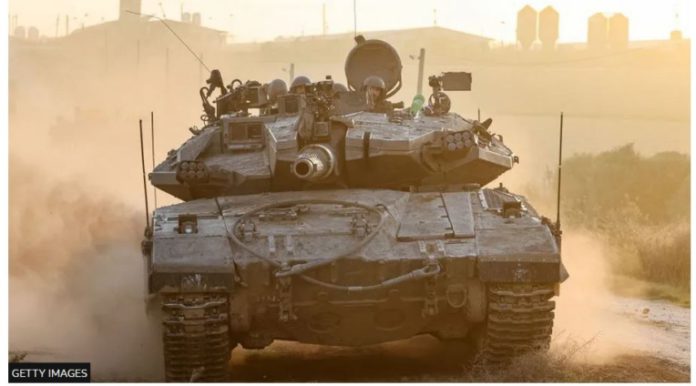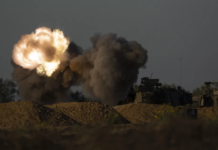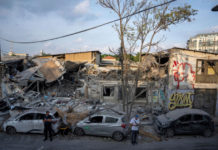
Israeli PM Benjamin Netanyahu has downplayed the chances of a truce in Gaza after Hamas gave what it called a “comprehensive vision” to mediators.
Mr Netanyahu’s office said the proposals were “unrealistic”.
Hamas wants a permanent end to the war and full Israeli withdrawal from Gaza.
On Thursday night Gaza’s Hamas-run health ministry said 20 people had been killed as they waited for aid. Israel denies involvement and accuses armed Palestinians of firing at the crowds.
The incident took place at the Kuwaiti roundabout on the southern outskirts of Gaza City, a known drop off point for the little aid that reaches northern Gaza where the UN says children are dying of malnutrition and famine is looming.
In its latest update, the health ministry said 155 people were injured in the incident. People wounded in the attack were lying on the floor of Shifa hospital in Gaza City and medical teams struggling to deal with the number and type of injuries they had, it said.
In a statement the Israel Defense Forces (IDF) said it had facilitated the passage of 31 aid trucks to northern Gaza.
“Approximately one hour before the arrival of the convoy to the humanitarian corridor, armed Palestinians opened fire while Gazan civilians were awaiting the arrival of the aid convoy,” it said.
The firing continued as a crowd looted the trucks and some people were run over, the IDF said, adding that it was continuing to review the incident.
Despite rejecting the latest Hamas ceasefire proposal, Mr Netanyahu said an Israeli delegation would travel to Qatar to discuss what Israel wanted from a potential agreement.
He also approved plans for a military operation in the southern Gaza city of Rafah, where more than a million people from other parts of Gaza are sheltering.
The army was preparing for the evacuation of civilians, he said. On Thursday the IDF said it planned to move displaced Palestinians in Gaza to what it called “humanitarian islands” in the middle of the strip.
It is not clear what the “islands” will look like, or how they will operate. But the military suggested that aid and temporary housing would be provided. No timeframe has yet been given about when the operation could happen.
The UN and US have warned that a full-scale assault in Rafah could be disastrous but Israel has repeatedly signalled its need for such an operation, insisting Hamas cannot be fully removed in Gaza without targeting Rafah.
On Friday US Secretary of State Antony Blinken said the US needed to see a clear and implementable plan for any Rafah operation, including for how to get civilians out of harm’s way, and had not yet seen one.
Meanwhile a ship towing a barge loaded with 200 tonnes of food supplies was visible off the Gaza coast in a pilot voyage aimed at opening up a maritime route for aid.
Open Arms – a salvage vessel belonging to a Spanish charity of the same name – is towing a barge filled with rice, flour, legumes, canned vegetables and canned proteins.
Gaza has no functioning port, so the US charity behind the mission, World Central Kitchen, has been building a jetty to unload the cargo.
The quickest, most effective way to get aid into the territory is by road. But aid agencies say Israeli restrictions mean a fraction of what is needed is getting in.
Israel says it welcomes the creation of a maritime corridor and that it is facilitating the transfer of aid to Gaza while its forces continue to fight Hamas.
On Friday, Australia said it would resume funding to UNRWA – the main United Nations aid agency in Gaza. Australia and several other donors paused funding two months ago when Israel accused some of its staff of involvement in the 7 October attack on Israel by Hamas.
Australian foreign minister Penny Wong said government lawyers had advised that UNRWA “was not a terrorist organisation”.
Canada, Sweden and the EU have already said they will resume funding to UNRWA but its biggest donor, the US, is maintaining a payment freeze.
Ms Wong urged Israel to let more food into Gaza.
“The Australian Government has been briefed by the World Food Program that there are large stocks of food outside of Gaza’s borders, but there is no way to move it across the border into Gaza and deliver it at scale without Israel’s cooperation and we implore Israel to allow more aid into Gaza now,” she said.
Israel has said that trucks containing aid have crossed into Gaza but have not been distributed and accuses aid agencies of logistical failures.
The war began when Hamas gunmen attacked southern Israel on 7 October, killing about 1,200 people and seizing 253 hostages. More than 31,400 people have been killed in Gaza since then, the Hamas-run health ministry says.






